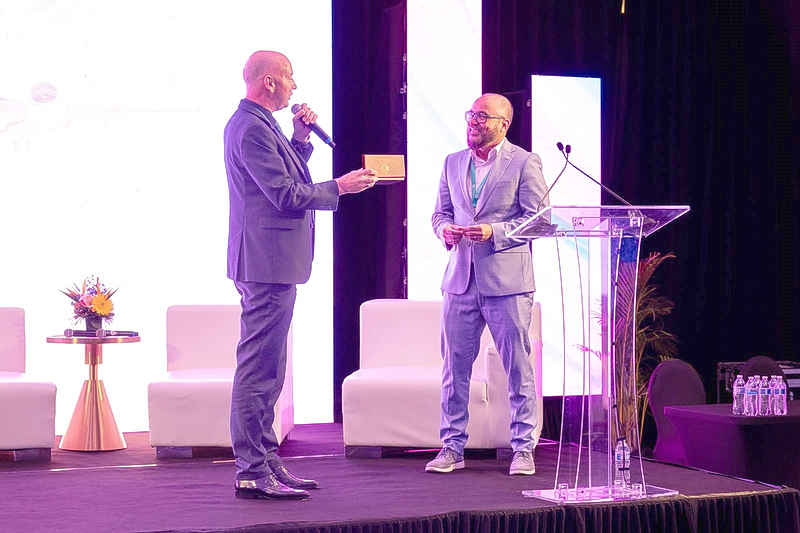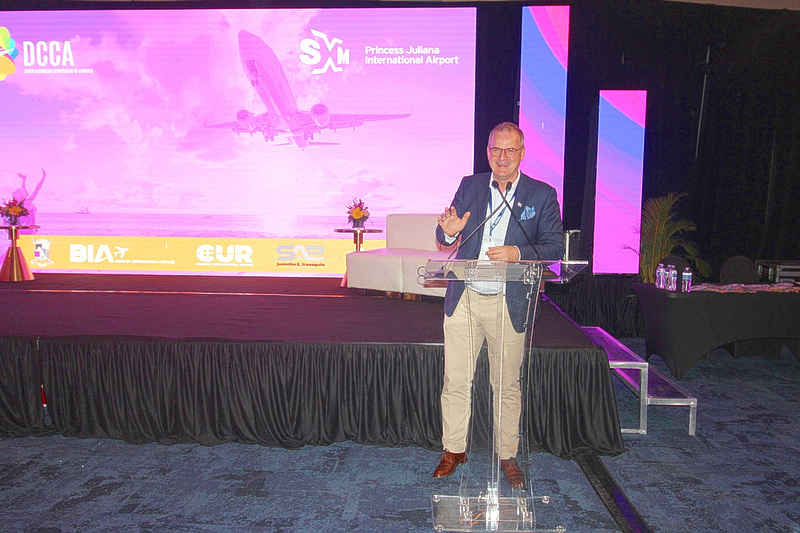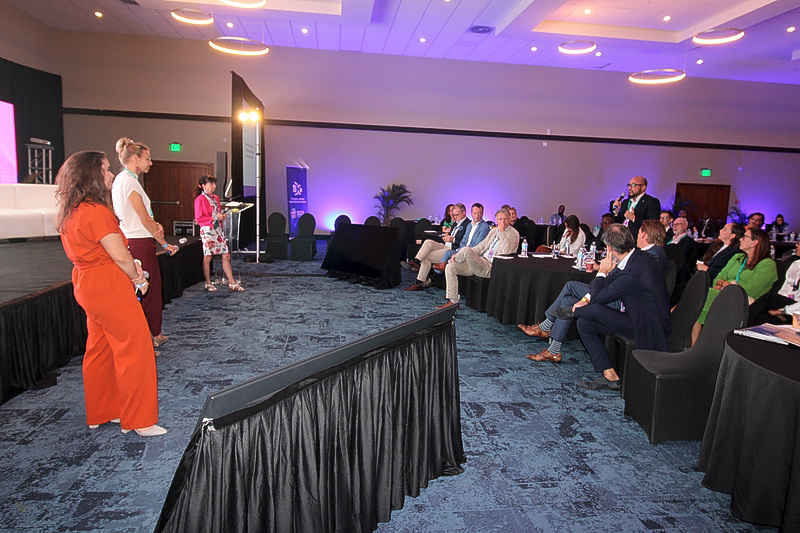TEATT Minister Grisha Heyliger-Marten gives her welcoming address on day one of the DCCA Conference. (Rochester Media Group photo)
MAHO--The third Dutch Caribbean Cooperation of Airports (DCCA) conference, the first in St. Maarten hosted by Princess Juliana International Airport (PJIA), concluded on Tuesday at Sonesta Beach Resort with delegates attending from the airports of Curaçao, Aruba, Bonaire, Saba, St. Eustatius and St. Maarten, and representatives of the airports of Saint-Martin Grand Case and Saint-Barthélemy.
 PJIA Commercial Director Michiel Parent presents PJIA CEO Brian Mingo with a symbolic golden key for his six years of service. (Rochester Media Group photo)
PJIA Commercial Director Michiel Parent presents PJIA CEO Brian Mingo with a symbolic golden key for his six years of service. (Rochester Media Group photo)
 DCCA Chairman Jonny Andersen giving his closing remarks at the end of the Conference. (Robert Luckock photo)
DCCA Chairman Jonny Andersen giving his closing remarks at the end of the Conference. (Robert Luckock photo)
 The interactive workshop on the role of regional authorities for sustainable connectivity. (Robert Luckock photo)
The interactive workshop on the role of regional authorities for sustainable connectivity. (Robert Luckock photo)
Representatives of the Dutch Ministry of Infrastructure, the airlines, suppliers, and other industry stakeholders took part.
The all-encompassing two-day programme included keynote speeches, panel discussions, topics ranging from regional connectivity, the challenge of lowering airfares and taxes, sustainability, innovation, climate adaption, leveraging funding, to concepts of new aircraft design and an electric-powered plane.
St. Maarten Minister of Tourism, Economic Affairs, Transport and Telecommunication (TEATT) Grisha Heyliger-Martin in her welcoming address said the Dutch Caribbean, with its unique geographical configuration and vibrant cultural diversity, has the potential to become a model of regional connectivity.
“Our airports serve as vital gateways, connecting our islands to the rest of the world and facilitating the flow of people, goods, and ideas. By enhancing our cooperation, we can ensure that these gateways operate at their full potential, providing seamless and efficient services to travellers and businesses alike,” she said. “As the voice of our airports, DCCA offers a very effective platform to achieve this.
“Meaningful cooperation means more than just working together; it means building trust, sharing knowledge, and aligning our efforts with a common vision. It requires us to engage in open dialogue, address our differences constructively, and seek solutions that are mutually beneficial. It is through this spirit of collaboration that we can overcome the barriers we have inherited and unlock new opportunities for growth and development.”
In his opening remarks, DCCA Chairman Jonny Andersen highlighted both the successes and challenges facing aviation in the Dutch Caribbean. He outlined five critical areas where DCCA sees
an urgent need for action: rising expenses, sustainability, collaboration, advocacy and accessibility.
“This year’s DCCA Conference has demonstrated the power of collaboration in advancing meaningful change for the Caribbean region,” he said.
Andersen also expressed concern over the challenges the industry faces in the future of higher taxes.
“As tourism grows in the Dutch Caribbean we see a lot of tax increases being imposed by the new government in the Netherlands towards long-haul flights and that will affect us directly. To board a plane from Schipol Airport, for example, you pay 29 euros in fees and taxes per passenger and that will more than triple in three years from now,” he explained.
“There is also talk of a new long-haul tax which we have calculated will add an extra 50 euros, so to visit the Dutch Caribbean you will be paying around 90 euros per ticket per passenger one way.”
Andersen said DCCA is opposing this new measure and lobbying the government for an exemption. “It may be fine for the Netherlands, but it’s going to have a huge impact on family and friends and the tourism sector.”
On this note, DCCA airports are reducing their fees for service between the Dutch islands. Starting next year as of January 1, 2025, the fees will drop from around US $34 per passenger to $15. WINAIR and other local airlines are committed to giving back to make travel more affordable, even if it is a small reduction.
“We want to stimulate the growth from being flat to what it was 15 years ago.” Upgrading infrastructure of airports in the islands also has to be strengthened in view of extreme weather,” Andersen added.
Presentations on Monday included “The Societal Impact of Mobility and Innovation in Aviation” and “Engineering the Future of Transportation.”
There were three powerful presentations on climate change. Tadzio Bervoets spoke on “Climate change and its Impact on the Caribbean” while Riddhi Samtani addressed “Resiliency and Vulnerability in the face of Climate Change.” The third presentation was “What can Airports do to Mitigate Climate Change Risks?”
Representatives of the respective tourism offices of Saint-Martin, St. Maarten, Anguilla, Saint Barthelemy and Curaçao weighed in on “The future of Mass Tourism in the Caribbean.”
On day two, WINAIR Chief Executive Officer (CEO) Hans van der Velde presented a case study on “Affordable Day Travel”.
Robert Geurts, an aeronautical engineer from Airport Asset Design, talked about his feasibility study for using wing to ground-effect aircraft for inter-island transport while Taco Stouten from the company Vaeridion gave insight into the future of electric-powered flight.
Caribbean area manager Annaleen Lord from the International Air Transport Association (IATA) responsible for 29 countries, gave a surprising statistic in her presentation “Regional Developments beyond Airline Domain”.
“As an economic powerhouse, aviation holds immense untapped potential. Some 80% of the world’s population has never taken a flight. In other words four out five people have never set foot in a plane. Imagine the potential dreams and opportunities in source markets that have yet to take flight. To tap into this potential we must collaborate across the entire aviation chain to make air travel more accessible and inclusive.”
In the afternoon Marjan van Giezen from the Directorate of Civil Aviation and the Ministry of Infrastructure and Water Management led an interactive workshop on “Sustainable Connectivity: The Role of Regional Authorities”.
Bianca Peters from liaison strategic partnerships for Bonaire, St. Eustatius and Saba to the EU, UN, Latin America and the Caribbean with colleague Edison Rijna gave a presentation on “Leveraging International Networks for Funding, Collaboration and Innovation.”
Asked what his take-away from the conference was, PJIA CEO Brian Mingo said collaboration is key.
“No airline or tourism destination can survive on its own without collaboration. We all have the desire to facilitate tourism. For me the evolution of aircraft is the future, to get away from fossil fuels to electric planes. It’s always an interesting topic and makes sense for short hops between islands. It’s happening already with vehicles, but not so much in the Caribbean.”
Mingo took on the airport restoration on a five-year contract, extended by one year. With his mission now completed, a new airport CEO will take over at the end of December 2024.
Created in 2021, the objective of the DCCA is for Dutch Caribbean airports to cooperate together, to exchange competences and skills, to learn from each other and to promote interests and address common challenges.







